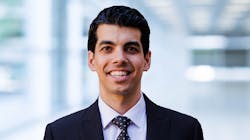One word to describe yourself: Motivated
Alma Mater: University of Granada, Spain and University of Illinois at Urbana-Champaign
Fast fact about yourself:
- I have used public transportation in more than 30 countries
- I have seen a volcano erupt less than 500 feet away (Volcán de Fuego in Guatemala)
- About 15 years ago, me and a couple of friends won the University of Granada Business Simulation competition
What’s your best experience on transit and what made it memorable?
One of the best memories is taking the overnight train from Beijing to Pingyao in China, especially as it was my first time traveling solo for an extended period. During the journey, a friendly local offered me a beer, sparking a delightful conversation that lasted for hours in the confines of the six-bed sleeping rail car. It was a memorable encounter that exemplified the beauty of connecting with strangers and experiencing the warmth of hospitality on the road.
Manuel Martin Ramos, PE, ENV SP, is a senior rail engineer with Arup. As part of the position, he leads and manages key components of complex infrastructure and station projects. What stands out the most about Ramos is his dedication and commitment to his projects and clients, as well as his passion for sharing his knowledge with emerging professionals to advance their interest and understanding of the transit industry.
Originally from Spain, Ramos believes there is a great opportunity to expand rail transit in the U.S. He strives to leverage innovation, digital transformation and technical excellence to help deliver public transportation projects that drive economic development and, more importantly, social equity and integration.
Ramos earned a Master of Science in Civil and Railroad Engineering from the University of Illinois while working as a graduate research assistant at the Rail Transportation Engineering Center (RailTEC). The tragic news of a derailment of a train transporting crude oil in Canada led him to direct the focus of his efforts on quantifying and modeling the risk associated with transporting hazardous materials by rail. He contributed to the development of state-of-the-art research that supported both the federal government, as well as several freight railroads.
After joining Arup, Ramos quickly became a key contributor to several major rail projects, including the New York City Transit (NYC Transit) and Metro North Railroad Enhanced Station Initiatives. He also led the development of the Penn Station Capacity Improvement studies for New Jersey Transit (NJ Transit), which resulted in new innovative track and station configuration concepts for the expansion of Penn Station.
Ramos has also supported and invested time in the development of innovative digital technologies to bring significant value to projects and deliver effective solutions for clients. He has worked along with the Northeast Corridor Commission (NECC) to develop the Connect NEC 2037 program, an ambitious 15-year strategic development plan for one of the busiest, most economically vital transportation systems in the world. As the delivery analysis lead, he is overseeing the team that is analyzing more than 200 major capital projects and renewal works along the entire 457-mile corridor. He also spearheaded the development of several digital tools to support the analysis and communicate the results in a way that is easily understood by stakeholders and the client. Ramos’s understanding of railroad projects design and delivery paired with his development of innovative tools is providing exceptional value for the infrastructure program, which will help keep the railroad operating safely and reliably for millions of passengers.
Recognizing the threats of climate change, Ramos has also contributed to the resiliency and sustainability of transit systems. Following Hurricane Sandy’s impact to NYC Transit in 2012, Arup worked with the agency to repair damaged infrastructure and identify and mitigate vulnerabilities to future storm events. A certified Envision Sustainability Professional, Ramos’s uniquely diverse technical experience and understanding of the NYC Transit system were instrumental to the success of the resiliency program. His attention to detail and technical excellence ensured an effective implementation of flood mitigation solutions that will protect hundreds of critical subway assets.
Currently, Ramos is playing a critical role in the New York Penn Station Expansion project. As a senior track designer, he is helping to deliver increased capacity, reliability, resiliency and operational flexibility for all passengers. His demonstrated leadership in providing key strategic and technical input to the more than 200-person multidisciplinary team is helping to ensure the design is fully coordinated and carefully delivered.
Ramos has also demonstrated a dedication to sharing his knowledge with others. He has played a key role in attracting junior engineers to the industry through sharing his passion for transit, participating in events like Meet the Next Generation, as well as training and mentoring young engineers to support their professional development. In addition, he is well connected in the industry as an active member of the American Railway Engineering and Maintenance-of-Way Association , where he is part of two technical committees. Ramos also served as a technical reviewer for the Joint Rail Conference and has shared his technical knowledge and project lessons learned at many major conferences during the past decade. He is described by his colleagues and clients as an inspiration.
Is there a specific experience that led you to where you are today?
It has definitely been a combination of experiences and decisions throughout the years. While I have always been passionate about engineering and public transit (thanks in large to my parents!), more than a decade ago, I took “Railroad Transportation Engineering” a class that Professor Christopher Barkan taught at the University of Illinois at Urbana-Champaign. His passion and knowledge for rail transportation were an inspiration, underscoring the industry's significant role as a catalyst for both economic growth and societal transformation. Soon after, I applied to obtain a master’s degree in Transportation and Railroad Engineering while doing research at RailTEC the department Barkan leads. Since graduating, I have been working at Arup, dedicated to assisting clients improve rail transportation systems around the country.
What do you enjoy most about your job?
The dynamic interaction with people and the constant opportunity to learn while tackling complex challenges. Working closely with colleagues allows me to form meaningful connections and foster a collaborative environment that fuels innovation. Each day brings unique and intricate problems to solve and I relish the chance to apply my problem-solving skills to find creative solutions.
What’s the most challenging part of your job?
I find that technically most problems are solvable, so the most challenging (but rewarding) aspect of my job is effectively managing expectations while balancing project requirements, scope and resources to provide the best value for clients. Despite the complexities, these challenges drive me to grow as a professional and find innovative solutions that provide meaningful impact.
Accomplishment you’re most proud of and why?
From a professional perspective it is probably successfully delivering three small feasibility studies for NJ Transit that focused on enhancing capacity at Penn Station. These projects were undertaken early in my career and witnessing the impact they have had, including now being involved in the actual design of the station's future expansion led by Amtrak, is incredibly rewarding. Knowing my work has contributed to improving a critical transportation hub brings me a profound sense of achievement and motivates me to continue making a positive impact in my field.
Best advice/tip/best practice to share from your area of expertise?
The best advice I can offer is to be committed to lifelong learning, embrace humility in problem-solving and maintain a positive and collaborative attitude. By continuously seeking knowledge, we can stay adaptable and be at the forefront of our field. Humility fosters effective teamwork and open-mindedness when approaching challenges. Additionally, being positive and pleasant to work with creates a supportive and harmonious work environment, enhancing productivity and fostering strong relationships with colleagues and clients alike. Like my boss says, we are a “people business”.
About the Author
Eman Abu-Khaled
Associate Editor
Eman Abu-Khaled is a former associate editor with Mass Transit magazine.

